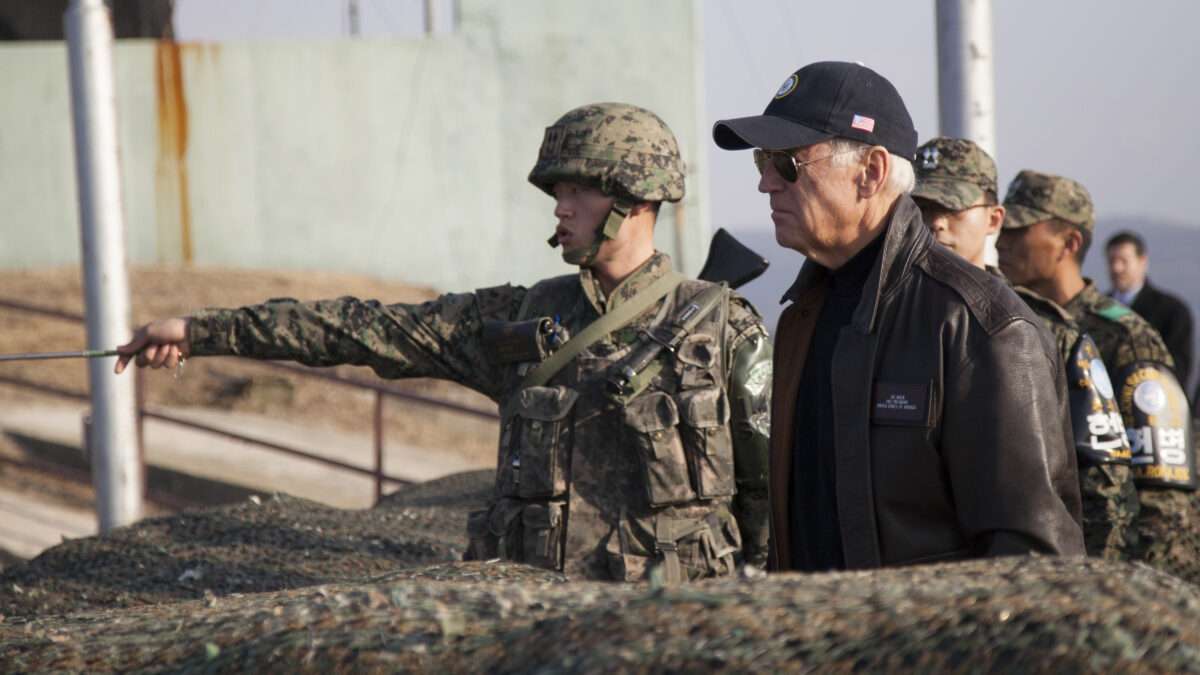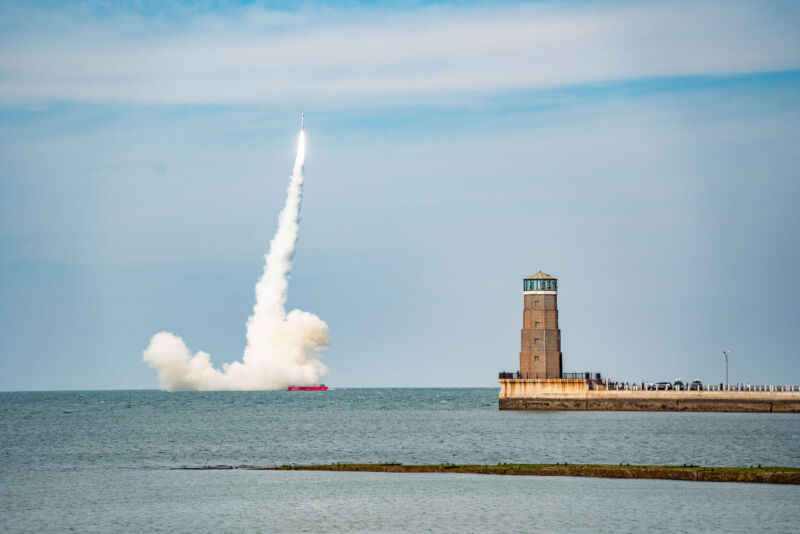Democratic Platform Attacks Trump for Not Going to War

Donald Trump oversaw some scary moments in international politics. The former president seriously escalated tensions with North Korea and Iran, leading to several war scares. But he pulled back from the brink, sometimes against the wishes of his more hawkish advisers. He avoided a direct U.S.-Iranian war and opened a direct line of communication with North Korea.
Democrats seem to wish he'd gone to war instead. The Democratic National Committee's 2024 platform, approved in a symbolic vote on Monday night, tries to outhawk Trump, denouncing his "fecklessness" on Iran and his "love letters" to North Korea. Although the platform condemns Trump for pulling out of diplomacy with Iran, it also attacks his decisions not to bomb Iran at several crucial points.
Ironically, the Democratic platform is not much different from Republicans' own attacks on the Biden administration. Each side accuses the other of weakness, and neither wants to take credit for diplomacy or own the compromises necessary to avoid war.
It's easy to forget now, but in 2017 the Korean peninsula had become a remarkably tense place. North Korea was testing nuclear weapons and intercontinental ballistic missiles capable of hitting U.S. soil. The U.S. military was massing forces in the region, and Trump was issuing threats.
Trump's national security adviser, H.R. McMaster, reportedly called for a military attack aimed at giving North Korea a "bloody nose." McMaster and Sen. Lindsey Graham (R–S.C.) publicly warned that war might be inevitable.
And then, in January 2018, a false alarm drove home the lesson that nuclear war is nothing to play around with. During a disaster preparedness drill, authorities in Hawaii accidentally sent an alert about an incoming ballistic missile. For more than half an hour, Hawaiians and tourists were convinced that they were going to die in a nuclear war.
A few months later, McMaster was out of the White House. Trump accepted an invitation to meet with North Korean leader Kim Jong Un in June 2018. Trump met Kim again in February 2019. Stepping over the North Korean–South Korean border in June 2019, Trump became the first U.S. president to visit North Korea.
The meetings failed to secure a permanent agreement—it didn't help that McMaster's replacement, John Bolton, publicly hinted that denuclearization would end in Kim's violent death—but they bought some crucial breathing room.
The Democrats' 2024 platform attacks the very idea of talks with North Korea. Trump's approach, the platform says, was "embarrassing the United States on the world stage including by flattering and legitimizing Kim Jong Un, exchanging 'love letters' with the North Korean dictator."
This isn't a break with past Democratic rhetoric. During the presidential debates in 2019, then-candidate Joe Biden said that Trump gave "North Korea everything they wanted, creating the legitimacy by having a meeting with Kim Jong Un." Another candidate, Kamala Harris, said that there are "no concessions to be made. He has traded a photo op for nothing."
If even talking to North Korea is a "concession," then it's hard to see what alternative Harris would accept, other than continuing to barrel towards nuclear war.
Iran, unlike North Korea, does not have nuclear weapons. In 2017, Trump tore up an international agreement that regulated Iranian nuclear activities, instead betting on a "maximum pressure" campaign designed to overthrow the Iranian government by cutting off its oil exports. Bolton later said in his memoir that "only regime change would ultimately prevent Iran from possessing nuclear weapons," and then–Secretary of State Mike Pompeo was obsessed with killing the Iranian general Qassem Soleimani.
The Iranian government did not react warmly to the maximum pressure campaign. Iranian forces encouraged rocket attacks on U.S. bases in Iraq, and Iran is believed to be behind sabotage attacks on the international oil industry, including a September 2019 drone strike on Saudi oil infrastructure.
The U.S. military massed forces off the coast of Iran during this time. On June 19, 2019, Iran shot down an American surveillance drone. (The two countries disagree on whether the drone was in Iranian airspace.) Trump ordered a bombing raid on Iranian air defense batteries, then pulled back at the last minute, because killing Iranian troops was "not proportionate to shooting down an unmanned drone."
Although the Democratic platform calls maximum pressure a "reckless and short-sighted decision," it also attacks Trump for failing to hit Iran back at each of these points. "Trump's only response" to an Iraqi militia attack on the U.S. consulate in Basra "was to close our diplomatic facility," the Democrats complain, and "Trump failed to respond against Iran or its proxies" for the attack on Saudi oil facilities.
The platform is somewhat ambiguous on whether Trump should have bombed Iran in June 2019. "Trump responded by tweet and then abruptly called off any actual retaliation, causing confusion and concern among his own national security team," it says. Perhaps putting American lives at risk to avenge the honor of a robot would be too far even for the Biden team.
Maximum pressure reached its climax in January 2020, when Trump followed Pompeo's advice and ordered the military to assassinate Soleimani. Iran responded by launching 12 ballistic missiles at a U.S. base in Iraq, which injured Americans but did not kill anyone. Trump called it even, claiming that "Iran appears to be standing down, which is a good thing for all parties concerned."
At the time, Democrats were highly critical of the decision to risk war by killing an Iranian officer. "Trump just tossed a stick of dynamite into a tinderbox," Biden wrote right after Soleimani was assassinated. After the Iranian retaliation, Democrats immediately put forward a war powers resolution making it clear that the president does not have the authority to start a war with Iran.
The current Democratic platform takes a different tone. When "Iran, for the first and only time in its history, directly launched ballistic missiles against U.S. troops," the document declares disapprovingly, Trump "again took no action." The platform criticizes Trump for making light of U.S. troops' brain injuries without mentioning the assassination that prompted the Iranian attacks in the first place.
After all, it would be hard for Biden to criticize Trump for bringing America to the brink of war in the Middle East when he has done the same.
After four short years of a Democratic administration, the mood among Democratic leaders has gotten more hawkish, especially as the defense of Ukraine gives them a "good war" to rally behind. But that's not necessarily how the American people, including Democratic voters, feel. Direct talks with North Korea are still popular, and direct war with Iran is still unpopular. Republicans and independents are less likely to call themselves hawks than in 2014, and even Democratic voters are only one percentage point more likely to consider themselves hawkish than before.
There is a public appetite for diplomacy and deescalation. But party leaders don't seem to want to take the opportunity. They would prefer to fight over who can outhawk whom.
The post Democratic Platform Attacks Trump for Not Going to War appeared first on Reason.com.





